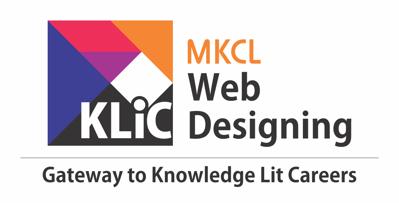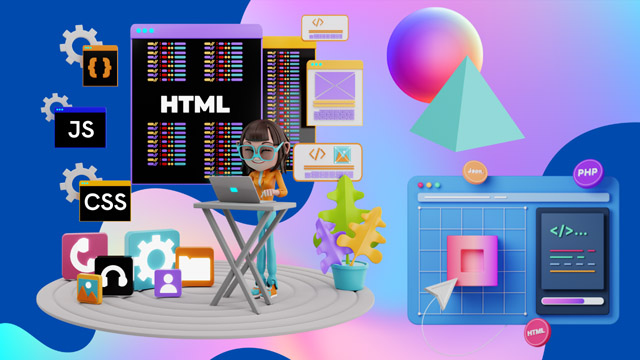- Explain ACID properties, transaction states, and concurrency control mechanisms.
- Demonstrate lock-based protocols and deadlock prevention techniques.
- Create triggers for automating database operations using BEFORE, AFTER, and INSTEAD OF triggers.
- Analyze authentication methods, SQL injection prevention, and access control mechanisms.
- Design structured web pages using HTML elements, forms, and attributes.
- Implement CSS properties, layouts, and responsive design techniques.
- Integrate PHP with HTML and CSS to create dynamic web pages.

Mastering HTML, CSS, and PHP for Dynamic Websites
Integrate frontend and backend technologies to create responsive and interactive websites.
KLiC Certificate in Mastering HTML, CSS, and PHP for Dynamic Websites
Introduction
What you'll learn ?
- Apply locking techniques to ensure database consistency.
- Develop triggers to automate database modifications.
- Analyze and apply SQL security measures to protect against unauthorized access.
- Construct static web pages with forms, tables, and multimedia elements.
- Implement CSS styling techniques for modern and responsive web layouts.
- Develop PHP scripts that interact with web pages dynamically.
- Structure PHP projects effectively using namespaces.
Syllabus
- ACID Properties
- Transaction States
- Lost Update Problem
- Serial schedule vs non-Serial schedule
- View and Conflict Serializability
- Examples
- lock Based protocol in DBMS and its properties
- Properties of Lock Based protocol
- Conservative locking
- Rigorous Locking
- Strict locking
- Deadlock handling
- Deadlock prevention
- Need for Trigger
- Trigger in SQL
- Trigger Example
- Instead Trigger
- Instead Trigger Example
- Security
- Authentication
- Authorization
- Difference between authentication and Authorization
- SQL Injection
- Stored Procedure
- Stored procedure for select
- Stored procedure for update
- Stored procedure for delete
- Stored procedure for insert
- Single procedure
- Introduction
- Creating Basic Html file
- html Elements
- html heading
- html paragraph
- Including link and images
- Example showing Demo of all
- Introduction
- html styles
- html Quotation
- html comments
- html colour
- html list
- html block inline and outline
- Introduction
- html Forms Attributes
- html Forms Elements
- html Input Types
- html Input Attributes
- Html Listing Tags
- html marquee Tag
- html perforated and horizontal rule
- html audio Tag
- Html Audio Tag
- html Anchor Tag
- html Website Layout
- Introduction
- CSS Syntax
- CSS Selectors
- Multiple style sheet
- Cascading order
- CSS background with examples
- CSS Borders
- CSS margin
- CSS Padding
- CSS Height and width
- CSS box model
- CSS z index
- CSS Overflow
- CSS Align
- CSS forms
- CSS counter
- CSS Website Layout
- CSS viewport
- CSS container and Grid
- CSS Image and video
- PHP Basics
- HTML Embedding
- Comments
- Variables
- Constants
- String & int
- Float & Boolean
- Object, Null &array
- Resource
- PHP Forms
- How to create form
- PHP form with live examples
- PHP Date and time
- Building PHP Scripts
- Example
- PHP JavaScript using name validation
- PHP JavaScript using for range validation
- PHP JavaScript using field validation
- Introduction
- Sub Namespace
- Multiple Namespace
- Global Namespace
- Namespace with PHP build in Names
- Namespace use operator
- Cookies
- Creating, accessing & deleting cookie
- Replace and append cookie
- Session
- Query String
- Example of Query String
Certificate
- MKCL provides certificate (for 30/60/90 hours courses) to the KLiC learner after his/her successful course completion.
Academic Approach
The Academic Approach of the course focuses on the “work centric” education i.e. begin with work (and not from a book !), derive knowledge from work and apply that knowledge to make the work more wholesome, useful and delightful. The ultimate objective is to empower the Learner to engage in socially useful and productive work. It aims at leading the learner to his/her rewarding career as well as development of the society.
Learning methodology
- Learners are given an overview of the course and its connection to life and work.
- Learners are then exposed to the specific tool(s) used in the course through the various real-life applications of the tool(s).
- Learners are then acquainted with the careers and the hierarchy of roles they can perform at workplaces after attaining increasing levels of mastery over the tool(s).
- Learners are then acquainted with the architecture of the tool or Tool Map so as to appreciate various parts of the tool, their functions and their inter-relations.
- Learners are then exposed to simple application development methodology by using the tool at the beginner’s level
- Learners then perform the differential skills related to the use of the tool to improve the given ready-made outputs.
- Learners are then engaged in appreciation of real-life case studies developed by the experts.
- Learners are then encouraged to proceed from appreciation to imitation of the experts.
- After imitation experience, they are required to improve the expert’s outputs so that they proceed from mere imitation to emulation.
- Finally, they develop the integral skills involving optimal methods and best practices to produce useful outputs right from scratch, publish them in their ePortfolio and thereby proceed from emulation to self-expression.
Evaluation Pattern
Evaluation Pattern of KLiC Courses consists of 4 Sections as per below table:
| Section No. | Section Name | Total Marks | Minimum Passing Marks |
|---|---|---|---|
| 1 | Learning Progression | 25 | 10 |
| 2 | Internal Assessment | 25 | 10 |
| 3 | Final Online Examination | 50 | 20 |
| Total | 100 | 40 | |
| 4 | SUPWs (Socially Useful and Productive Work in form of Assignments) | 5 Assignments | 2 Assignments to be Completed & Uploaded |
MKCL’s KLiC Certificate will be provided to the learner who will satisfy the below criteria:
- Learners who have successfully completed above mentioned 3 Sections i.e. Section 1, Section 2 and Section 3
- Additionally, learner should have completed Section 4 (i.e. Section 4 will comprise of SUPWs i.e. Socially Useful and Productive Work in form of Assignments)
- Learner has to complete and upload minimum 2 out of 5 Assignments
Courses Fee Structure from 01 July, 2025 Onwards
KLiC 30 hour course fee applicable from 01 July, 2025 all over Maharashtra| KLiC Course Duration | MFO: MKCL Share (Including 18% GST) |
ALC Share (Service Charges to be collected by ALC) |
|---|---|---|
| 30 hours | Rs. 300/- | Rs. 1,500/- |
Important Points:
* Above mentioned fee is applicable for all Modes of KLiC Courses offered at Authorised Learning Center (ALC) and at Satellite Center
* Total fee is including of Course fees, Examination fees and Certification fees
* MKCL reserves the right to modify the Fee anytime without any prior notice
* Above mentioned fee is applicable for all Modes of KLiC Courses offered at Authorised Learning Center (ALC) and at Satellite Center
* Total fee is including of Course fees, Examination fees and Certification fees
* MKCL reserves the right to modify the Fee anytime without any prior notice
